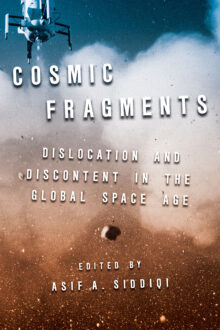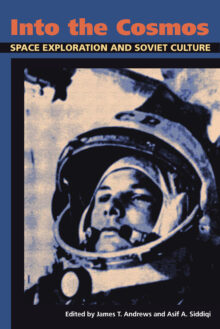
Asif A. Siddiqi
Asif A. Siddiqi is professor of history at Fordham University in New York. He writes and teaches on the history of science and technology as well as on modern Russian history. His books include The Red Rockets’ Glare: Spaceflight and the Soviet Imagination, 1857–1957 and the forthcoming Departure Gates: Global Histories of Space on Earth. Siddiqi is the recipient of a Guggenheim Fellowship (2015) and the coeditor of the Studies in the History of Science and Technology series at Johns Hopkins University Press.
Cosmic Fragments
Dislocation and Discontent in the Global Space Age
Looking beyond the well-trodden, celebratory narratives of space exploration and the powerful nostalgia of lunar landings, Cosmic Fragments focuses instead on the moral ambiguities of spaceflight. Beyond the fetishization of machines, men, and manifest destiny and the Cold War tensions of the space race lies a history rife with violence, racial inequity, colonial ambitions, and catastrophe. This volume yields new insights on the crucial role of environmental damage, Indigenous dispossession, population displacements, infrastructural entanglements, and narratives of decline in space exploration situated within larger questions in the history of science, technology, and the environment. Each chapter explores histories of space travel across nations and regions to better understand the destructive power of infrastructure, waste, and exploitative legal regimes at the height of the space age. Drawing from postcolonial science studies, science and technology studies, and anthropology, contributors suggest that phenomena designed to disenfranchise and dislocate, such as the displacement of Indigenous peoples, were deeply imbedded in the coloniality of space travel. By confronting and challenging problematic early accounts rooted in the cultural mores of settler colonialism, Cosmic Fragments offers a fundamental repositioning of the history of spaceflight.
Into the Cosmos
Space Exploration and Soviet Culture
The launch of the Sputnik satellite in October 1957 changed the course of human history. In the span of a few years, Soviets sent the first animal into space, the first man, and the first woman. These events were a direct challenge to the United States and the capitalist model that claimed ownership of scientific aspiration and achievement.
The success of the space program captured the hopes and dreams of nearly every Soviet citizen and became a critical cultural vehicle in the countryÆs emergence from Stalinism and the devastation of World War II. It also proved to be an invaluable tool in a worldwide propaganda campaign for socialism, a political system that could now seemingly accomplish anything it set its mind to.
Into the Cosmos shows us the fascinating interplay of Soviet politics, science, and culture during the Khrushchev era, and how the space program became a binding force between these elements. The chapters examine the ill-fitted use of cosmonauts as propaganda props, the manipulation of gender politics after Valentina TereshkovaÆs flight, and the use of public interest in cosmology as a tool for promoting atheism. Other chapters explore the dichotomy of promoting the space program while maintaining extreme secrecy over its operations, space animals as media darlings, the history of Russian space culture, and the popularity of space-themed memorabilia that celebrated Soviet achievement and planted the seeds of consumerism.


